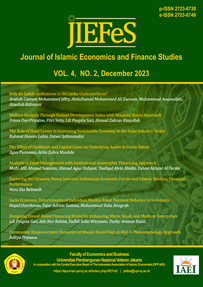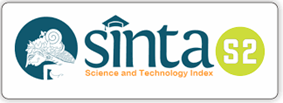The Role of Halal Center in Increasing Sustainable Economy in the Halal Industry Sector
DOI:
https://doi.org/10.47700/jiefes.v4i2.6465Keywords:
Halal Center, Halal Economy, Halal IndustryAbstract
The role of the Indonesian Ulama Council (MUI) in halal labeling is still considered ineffective. So, the government enacted Law Number 3 of 2014 concerning Halal Product Guarantees. Through this regulation, the authority for halal certification is given to BPJPH, through the Halal Center. The role of the Halal Center in improving the halal economy also has various challenges in terms of human resources, producer compliance, and the need for cooperation with related institutions. This research aims to determine the role of halal centers in boosting the halal economy in the Indonesian halal industrial sector. This research is a qualitative descriptive type of research. The research sources used come from books, scientific journals, encyclopedias, literature, works of scientists, and relevant websites. The object of this research is the role of halal centers in improving a sustainable halal economy in the halal industrial sector. The results of this research can conclude that the role of halal centers through certification, education, product innovation, and supervision is considered effective in improving the halal economy in the halal industrial sector in Indonesia. It is proven that in 2020, the number of halal certification registrations was 11,103, and in 2023 the number increased to 155,451.
Peran Majelis Ulama Indonesia (MUI) dalam pelabelan halal masih dinilai belum efektif. Sehingga pemerintah menetapkan UU Nomor 3 Tahun 2014 tentang Jaminan Produk Halal. Melalui aturan tersebut, wewenang sertifikasi halal diberikan kepada BPJPH, melalui Halal Center. Peran Halal Center dalam meningkatkan ekonomi halal juga memiliki berbagai tantangan baik dari sisi sumber daya manusia, kepatuhan produsen, serta perlunya kerja sama dengan intitusi yang berkaitan. Tujuan dari penelitian ini adalah untuk mengetahui peran dari halal center dalam mendongkrak ekonomi halal pada sektor industri halal Indonesia. Penelitian ini berjenis deskriptif kualitatif. Sumber-sumber penelitian yang digunakan berasal dari buku, karya ilmiah jurnal, ensiklopedia, literatur, karya ilmuan, serta website yang relevan. Objek pada penelitian ini yaitu mengenai peran halal center dalam meningkatkan ekonomi halal yang berkelanjutan di sektor industri halal. Hasil penelitian ini dapat disimpulkan bahwa peran dari halal center melalui sertifikasi, pendidikan, inovasi produk, dan pengawasan dinilai efektif dalam meningkatan ekonomi halal dalam sektor industri halal di Indonesia. Terbukti pada tahun 2020, jumlah pendaftaran sertifikasi halal sebanyak 11,103 dan pada tahun 2023 jumlahnya meningkat menjadi 155.451.
References
Agung Surya Dwianto, Eva Purnamasari, D. (2022). the Sharia Concept on Supply Chain Management in the Tourism Industry. Maqdis: Jurnal Kajian Ekonomi Islam, 7(1), 131–144.
Arifin, M. Y. (2021). Analisis Kewenangan Pemerintah Daerah Dalam Kebijakan Jaminan Produk Halal. Al Daulah : Jurnal Hukum Pidana Dan Ketatanegaraan, 1(1), 72. https://doi.org/10.24252/ad.v1i1.22844
Arsil, P., Wicaksono, R., Hidayat, H. H., & Novitasari, D. (2022). Strategi Kerjasama Pengembangan Institusi Halal: Implementasi Pada Halal Center. Jurnal Ilmiah Ekonomi Islam, 8, 2. https://doi.org/http://dx.doi.org/10.29040/jiei.v8i1.3794
BPMI-Setwapres. (2021). Empat Peran Penting Perguruan Tinggi Dalam Majukan Industri Produk Halal. https://www.setneg.go.id/baca/index/empat_peran_penting_perguruan_tinggi_dalam_majukan_industri_produk_halal#:~:text=Dengan adanya Halal Center%2C universitas,Lembaga Pemeriksa Halal (LPH).
Dewi Rahmawati Gustini, Muhammad Sigit Ismail, N. A. (2022). PERAN ORGANISASI KERJASAMA ISLAM (OKI) UNTUK MEMBANGUN INDUSTRI PARIWISATA HALAL DI INDONESIA. Journal of Economic Cooperation among Islamic Countries, 1(1), 1–25. https://doi.org/10.11111/moderasi.xxxxxxx
Hartanto, S. (2022). Perkembangan Ekonomi Syariah Di Era Modern. Universitas Sarjanawiyata Tamansiswa Yogyakarta Intisari, 6(1).
Hidayat, W. G. P. A. (2019). Managing Of The Halal Industry And The Purchase Intention Of Indonesian Muslims The Case of Wardah Cosmetics. Journal Of Indonesian Islam, 13(1), 2. https://doi.org/10.15642/JIIS.2019.13.1.200-229
Hidayatullah, M. S. (2020). Edukasi Ekonomi Syariah Berbasis Digital Melalui Instagram Pada Akun @Ruang Halal. Laa Maisyir : Jurnal Ekonomi Islam, 7(1), 31. https://doi.org/10.24252/lamaisyir.v7i1.13313
https://bpjph.halal.go.id/. (n.d.).
IHATEC. (2022). Apa Perbedaan antara Auditor Halal, penyelia Halal, & Pendamping Halal? https://ihatec.com/apa-perbedaan-antara-auditor-halal-penyelia-halal-pendamping-pph/
Indonesia, K. P. R. (2023). Siaran Pers : Indonesia Targetkan Jadi Kampiun Industri Halal. Kemenprin.Go.Id. https://kemenperin.go.id/artikel/24049/Indonesia-Targetkan-Jadi-Kampiun-Industri-Halal
Pasal 40 Ayat 1 Peraturan Pemerintah Nomor 31 Tahun 2019, (2019).
Lubis, R. H., Faridhun, U. Z., & Ramadhani, E. (2023). IMPLEMENTASI UNDANG-UNDANG NO 33 TAHUN 2014 DAN TINJAUN MAQHASID ASY SYARIAH TERHADAP INDUSTRI GERAI ES CREAM MIXUE. Yurisprudentia: Jurnal Hukum Ekonomi, 9(1), 800–808.
Noviarita, H., Kurniawan, M., & Nurmalia, G. (2021). Analisis Halal Tourism dalam Meningkatkan Laju Pertumbuhan Ekonomi di Provinsi Lampung. Jurnal Ilmiah Ekonomi Islam, 7(1), 302. https://doi.org/10.29040/jiei.v7i1.1574
Rahmat Husein Lubis. (2022). BPJPH Halal Certification Opportunities in Indonesian Sharia Tourism in the Perspective of Maqashid Asy-Syari ’ ah. Proceeding The International Conference on Islamic Studies 5th, 800–808.
Razalia, Ramadhan, Angga Syahputra, dan A. K. U. (2021). Industri Halal di Aceh: Strategi dan Perkembangan. Jurnal Al-Qardh, 6(1), 17–29.
Rohaeni, Y., & Sutawijaya, A. H. (2020). Pengembangan Model Konseptual Manajemen Rantai Pasok Halal Studi Kasus Indonesia. J@ti Undip : Jurnal Teknik Industri, 15(3), 177–188. https://doi.org/10.14710/jati.15.3.177-188
Ruhaeni, N., & Aqimuddin, E. A. (2023). Halal Food Certification As An Exception Clause Under The Rule Of The WTO_GATT: An Indonesia Experience. Cogent Social Sciences, 9, 15. https://doi.org/https://doi.org/10.1080/23311886.2023.2260160
Samsul, Muslimin, S., & Jafar, W. (2022). Peluang dan Tantangan Industri Halal Indonesia Menuju Pusat Industri Halal Dunia. Al-Azhar Journal of Islamic Economics, 4(1), 12–24. https://doi.org/10.37146/ajie.v4i1.135
Saputri, O. B. (2020). Pemetaan potensi indonesia sebagai pusat industri halal dunia. Jurnal Masharif Al-Syariah: Jurnal Ekonomi Dan Perbankan Syariah, 5(2), 23–38.
Sariati, N. P. (2019). Lifestyle Generasi Millenial Dalam Kerangka Pasar Ekonomi Halal. ISTITHMAR, 3, 2.
Setiawan, A. E., Noviarita, H., & Hanif. (2022). Optimalisasi Peran Perbankan Syariah Dalam Mengembangkan Industri Produk Halal: Studi Pada Industri Fashion Busana Muslim Di Provinsi Lampung. Jurnal Syarikah, 8(2), 197–207.
Siska Lis Sulistiani. (2018). Analisis Maqashid Syariah Dalam Pengembangan Hukum Industri Halal Di Indonesia. Jurnal Law and Justice, 3(2), 91–97. https://doi.org/10.23917/laj.v3i2.7223
State of the Global Islamic Economy Report. (2022). State of the Global Islamic Economy Report. DinarStandard, 1–40.
Sugiyono. (2008). Penelitian Kualitatif. CV. Alfabeta.
Sungkawaningrum, F. (2019). Eksplorasi peran perbankan syariah dalam memajukan industri halal di sektor makanan halal. Ekplorasi Peran Perbankan…. Wahana Islamika: Jurnal Studi Keislaman Vol. 5 No. 2 (2019) Pp. 32-17, 5(2), 32–48.
Syarif, F. (2019). Pertumbuhan dan Keberlanjutan Konsep Halal Economy di Era Moderasi Beragama. Jurnal Bimas Islam, 12(1), 93–122.
Tanjung, A., & Panggabean, S. A. (2022). Peluang Wisata Halal Terhadap Pengembangan Ekonomi Islam. Jesya, 5(2), 1470–1478. https://doi.org/10.36778/jesya.v5i2.754
Visi Hardian, M. G. H. (2020). Analisis Strategi Pemasaran Lph (Lembaga Pemeriksa Halal): Studi Pada Kantor Pusat Sbu Ksp P.T Sucofindo (Persero), Jakarta. Seminar Nasional Manajemen Dan Call for Paper (SENIMA 5), 1615–1639.
Warto, & Samsuri. (2020). Sertifikasi Halal dan Implikasinya Bagi Bisnis Produk Halal di Indonesia. Al Maal: Journal of Islamic Economics and Banking, 2(1), 98. https://doi.org/10.31000/almaal.v2i1.2803
Yudha, A. T. R. C., & Kafabih, A. (2021). Halal Industry during the Covid-19 Pandemic is The Hidden Blessing. El-Qist: Journal of Islamic Economics and Business (JIEB), 11(1), 17–32. https://doi.org/10.15642/elqist.2021.11.1.17-32
Yuwanisya, E., Syariah, J. P., Ekonomi, F., & Bisnis, D. A. N. (2020). Peran Bank Syariah Dalam Mendukung Pengembangan Industri Halal Melalui Halal Center Pada PT BPRS Buana Mitra Perwira Purbalingga. IAIN Purwokerto.
Zainol Hasan, & Mahyudi, M. (2020). Analisis terhadap Pemikiran Ekonomi Kapitalisme Adam Smith. Istidlal: Jurnal Ekonomi Dan Hukum Islam, 4(1), 24–34. https://doi.org/10.35316/istidlal.v4i1.206
Zulfa, E. A., Ismail, T. Q., Hayatullah, I. K., & Fitriana, A. (2023). Regulation And Law Enforcement On The Protection Of Halal Products In Indonesia. Cogent Social Sciences, 9, 13. https://doi.org/https://doi.org/10.1080/23311886.2023.2273344
Downloads
Published
Issue
Section
License
Copyright (c) 2023 Rahmat Husein Lubis, Fatwa Syibromalisi

This work is licensed under a Creative Commons Attribution 4.0 International License.
Authors who publish with this journal agree to the following terms:
- Authors retain copyright and grant the journal right of first publication with the work simultaneously licensed under a Creative Commons Attribution 4.0 International License that allows others to share the work with an acknowledgment of the work's authorship and initial publication in this journal.
- Authors can enter into separate, additional contractual arrangements for the non-exclusive distribution of the journal's published version of the work (e.g., post it to an institutional repository or publish it in a book), with an acknowledgment of its initial publication in this journal.
- Authors are permitted and encouraged to post their work online (e.g., in institutional repositories or on their website) before and during the submission process, as it can lead to productive exchanges, as well as earlier and greater citation of published work.

This work is licensed under a Creative Commons Attribution 4.0 International License.











